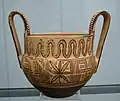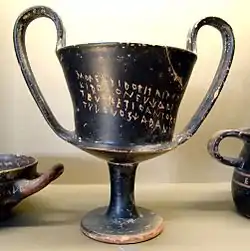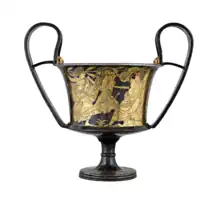Kantharos
A kantharos /ˈkænθəˌrɒs/ (Ancient Greek: κάνθαρος) or cantharus /ˈkænθərəs/ is a type of ancient Greek cup used for drinking. Although almost all surviving examples are in Greek pottery, the shape, like many Greek vessel types, probably originates in metalwork. In its iconic "Type A" form, it is characterized by its deep bowl, tall pedestal foot, and pair of high-swung handles which extend above the lip of the pot. The Greek words kotylos (κότῦλος, masculine) and kotyle (κοτύλη, feminine) are other ancient names for this same shape.[1]
_with_Female_Head_-_Walters_482763_-_View_A.jpg.webp)
The kantharos is a cup used to hold wine, possibly for drinking or for ritual use or offerings. The kantharos seems to be an attribute of Dionysos, the god of wine, who was associated with vegetation and fertility.[2]
As well as a banqueting cup, they could be used in pagan rituals as a symbol of rebirth or resurrection, the immortality offered by wine, "removing in moments of ecstasy the burden of self-consciousness and elevating man to the rank of deity."[3]
Gallery
 Bucchero kantharos (Latial culture, 830–730 BC)
Bucchero kantharos (Latial culture, 830–730 BC)

 Black-glaze kantharos with Boeotian inscription (Thespiae, 450–425 BC)
Black-glaze kantharos with Boeotian inscription (Thespiae, 450–425 BC) Side view of janiform kantharos with Herakles and woman (480–460 BC)
Side view of janiform kantharos with Herakles and woman (480–460 BC)
 Silver cantharus (Gaul, present-day Alise-Sainte-Reine, latter 1st century BC)
Silver cantharus (Gaul, present-day Alise-Sainte-Reine, latter 1st century BC)_LACMA_50.8.25.jpg.webp) Iliupersis Painter (South Italy, active 375-350 B.C.), Head-Kantharos of a Female Faun or Io (?), red-figure pottery
Iliupersis Painter (South Italy, active 375-350 B.C.), Head-Kantharos of a Female Faun or Io (?), red-figure pottery Janiform kantharos, Etruscan pottery, second half of the 4th century BC.
Janiform kantharos, Etruscan pottery, second half of the 4th century BC.
 kantharos, made in Athens, about 470 BC, British Museum
kantharos, made in Athens, about 470 BC, British Museum
Notes
- Andrew J. Clark; Maya Elston; Mary Louise Hart (2002), Understanding Greek Vases: A Guide to Terms, Styles, and Techniques, Getty, p. 101, ISBN 978-0-89236-599-9
- George W. Elderkin, Kantharos: Studies in Dionysiac and Kindred Cult (Princeton: Princeton University Press 1924):4
- Elderkin, Kantharos: Studies in Dionysiac and Kindred Cult, 2-6
References
- Gina Hander. "CU Classics: Greek Vase Exhibit: Kantharos". Colorado University.
- E. Mulder. "Boeotia, Land of the Kantharos" (PDF). University of Leiden.
